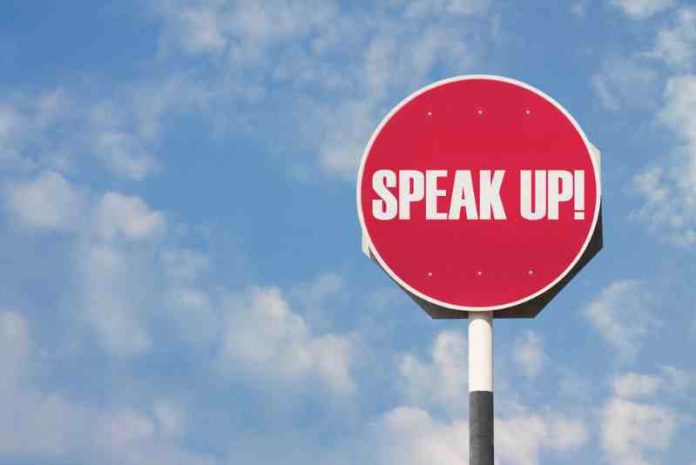Communication coach offers 5 healthy alternatives to ‘biting your tongue’
By Laleh Alemzadeh-Hancock
Avoiding confrontation. Dreading consequences. Trying not to offend or hurt someone. Naturally shy. Culturally sensitive. Or, just afraid to rock the boat. There are many reasons we may ‘bite our tongue’ and studies show just how often we choose to stay silent when we have something important to say:
- 69% of workplace managers resist communicating with their staff.1
- 72% of employees say they don’t speak up at work when they feel they should.2
- 74% of people are afraid of public speaking.3
- 65% of therapists say breakdown in communication is the top cause of divorce.4
Laleh Alemzadeh-Hancock is a communication coach, executive mentor, and Right Voice for You facilitator with clients all over the world. She says that ‘not speaking up’ in social and professional circles is a global epidemic … and she’s on a mission to help stop the spread of unhealthy silence.
“Culture plays a huge part in how we communicate but we all, to some degree, have learned to hold back our true thoughts when we fear the consequences,” Laleh explains. “For some, the fear is that they’re going to offend or dishonor someone. For others, it’s about not being seen as ‘nice’ or ‘polite.’ At work, we may be afraid of inviting ridicule, ostracization or admonishment. And we all struggle at times with revealing intimate parts of ourselves or sharing bad news.”
Sadly, Laleh says, staying silent when you need to speak is not just undermining your personal and professional relationships – it’s actually doing harm to your health and well-being as well.
“I like to say that our body has a ‘voice’ of its own, and when we bottle up important thoughts we create emotional toxins within our bodies. We create tension, stress and emotional imbalance … and all of these things can lead to illness, pain and disease,” Laleh cautions.
Rather than biting your tongue in difficult and confronting situations, Laleh offers five tips to get those words flowing:
- Be honest with yourself. “When we don’t want to speak up, we can tell ourselves lies such as, we’re not good enough, or that things won’t work in our favor. Ask yourself: If I was willing to be honest with me, what is my point of view about this situation?”
- Stop mimicking: “For most people, the social desire to ‘be like’ others is incredibly strong. If the people around us communicate in a certain way, we often mimic that behavior. I say, honor your difference because when you are authentic, you tend to have more confidence and resilience. Ask yourself: If I wasn’t trying to be like everyone else, who would I be? What would I choose?”
- Learn to know what you know. When we are used to stifling our voice, we begin to think that we don’t know anything (and that’s why we don’t speak up!). But the ideas, understandings and solutions that we have stored away in our unconscious can surprise us. Ask yourself: What do I know that will help resolve this situation? What feels ‘light’ to me?”
- Tailor your delivery for the best results. “This is vital when you are trying to communicate something important to you. Realize that some people can hear things best when it’s delivered frankly; others need to process information in bite-sized pieces. And, the same person may require a different approach at different times! Tailoring your delivery is not about holding back or biting your tongue – I see it as an act of kindness where you only give what the other person can receive. Ask yourself: What is the other person willing and able to hear right now?”
- Don’t expect a certain resolution. “It’s vital not to go into important interactions with an expectation that things will work out a certain way. This can stifle your authentic communication. Instead, be open minded, be ‘present’ and be willing to let the conversation flow. In this way, you are better able to appreciate when a discussion is best resolved on the spot, or if it should be left alone for a later time.”
“Most importantly, when you are speaking up authentically, understand that your target is to communicate without judgement,” Laleh remarks. “Don’t make it about anger, or blame, or shame. Following your authentic voice is about knowing what is going to create greater for everyone involved.”
- Interact/Harris Poll, 2016 | 2. Joseph Grenny and David Maxfield, 2016 | 3. US NIMH, 2016 | 4. Your Tango, 2013
Laleh Alemzadeh-Hancock is a life and communication coach, management and professional services consultant, and facilitator of several Access Consciousness® special programs including Right Voice for You and Being You. Laleh has inspired and empowered hundreds of thousands of individuals and families including Fortune 500 executives, government agencies, non-profit organizations, athletes and veterans. A lifelong entrepreneur and passionate change-agent, Laleh strives to seek out possibility in every problem and aims to facilitate strategic change and optimal growth for all her clients. Through her organization, Global Wellness for All, Laleh inspires individuals to create wellness in all areas of their life and seek greater success. Follow Laleh on Instagram and Facebook.
Speak up stock photo by JoemanjiArts/Shutterstock







